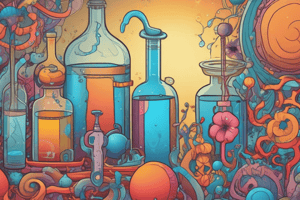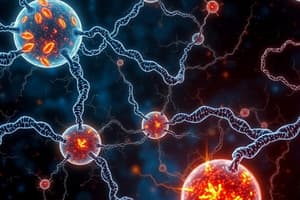Podcast
Questions and Answers
What is the end product of glycogenolysis after glucose-1-phosphate?
What is the end product of glycogenolysis after glucose-1-phosphate?
- Fructose-1,6-bisphosphate
- Pyruvate
- Glucose-6-phosphate (correct)
- Glycogen
Which hormone activates glycogen breakdown in the liver?
Which hormone activates glycogen breakdown in the liver?
- Cortisol
- Insulin
- Glucagon (correct)
- Adrenaline
What inhibits the process of glycogenolysis?
What inhibits the process of glycogenolysis?
- Glucagon
- Insulin (correct)
- Cyclic AMP
- Epinephrine
In which tissues does glycolysis primarily proceed after glycogenolysis?
In which tissues does glycolysis primarily proceed after glycogenolysis?
From where are glucose molecules removed during glycogenolysis?
From where are glucose molecules removed during glycogenolysis?
Flashcards
Glycogenolysis
Glycogenolysis
The breakdown of glycogen into glucose. Glucose molecules are removed one by one from the end of the glycogen chain to yield glucose-1-phosphate.
What triggers glycogenolysis?
What triggers glycogenolysis?
Glycogenolysis is activated by glucagon (in the liver) and epinephrine (in muscle).
What inhibits glycogenolysis?
What inhibits glycogenolysis?
Insulin inhibits glycogenolysis. Insulin signals the body to store glucose.
Glucose-1-phosphate
Glucose-1-phosphate
Signup and view all the flashcards
Glucose-6-phosphate
Glucose-6-phosphate
Signup and view all the flashcards
Study Notes
Glycogenolysis
- Glycogenolysis is the breakdown of glycogen into glucose
- Glycogen is broken down into glucose
- Glucose molecules are removed one at a time from the end of the glycogen chain. This yields glucose-1-phosphate.
- Glycogenolysis is activated by glucagon (in the liver) and epinephrine (in the muscle)
- Glycogenolysis is inhibited by insulin
- Glucose-1-phosphate is converted to glucose-6-phosphate
- Glucose-6-phosphate enters glycolysis (in liver and kidneys) to produce glucose.
Studying That Suits You
Use AI to generate personalized quizzes and flashcards to suit your learning preferences.




